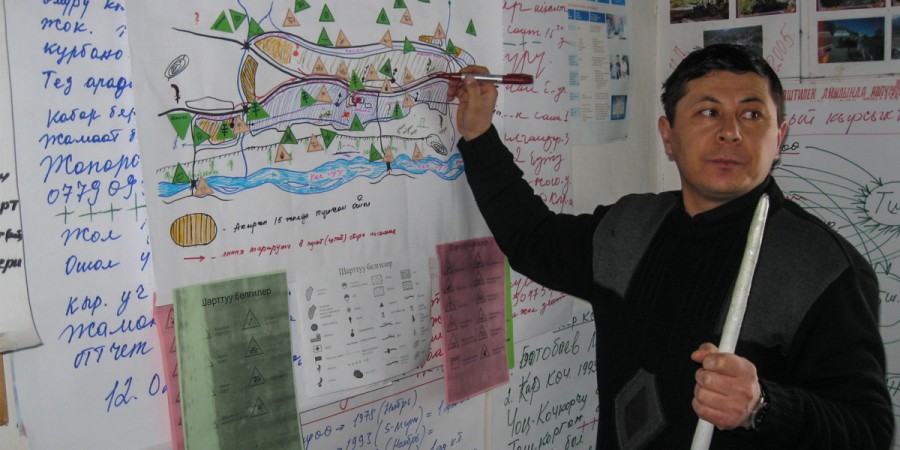The final World Humanitarian Summit regional consultation for South and Central Asia is taking place next week in neighboring Tajikistan. This is a unique chance for organizations like ours to contribute to the dialogue on the future of humanitarian response. Echoing the consultation’s theme of localizing preparedness and response, we must also localize disaster risk reduction. Today’s leaders in risk reduction are tomorrow’s pioneers of effective humanitarian response in their own communities. One of our current projects in Kyrgyzstan illustrates that through innovation and local opinion-leaders you can really make a difference in how people view and approach hazard risks.
Known for its diverse natural beauty, Kyrgyzstan remains one of the most disaster-prone countries in the world. Frequent earthquakes, seasonal mudflows and floods, pose a significant danger to the lives and livelihoods of Kyrgyzstan’s predominantly mountainous population.
It doesn’t help that over 75 per cent of private housing in Kyrgyzstan has been built in violation of anti-seismic laws, according to the Ministry of Emergency Situations of the Kyrgyz Republic (MoES KR). This means that more than 3 million people, out a population of 5.5 million are exposed to significant risk.
In this environment, there is only so much a small local organization like ours can do. We cannot relocate people to safer places nor can we retrofit their houses. But we realized that what we could do was to find a way to make people think about the risks they are facing and what they can do to minimize these risks.
Knowing our context, we sensed that the predominantly Muslim population in the communities where we are working holds a belief that whether they live or die as a result of a disaster is at the will and mercy of God. This then presents challenges to leaders to convince people that preparations and risk mitigation is necessary. To confirm our ideas we conducted a survey and the results corroborated our prognosis. Over 67 per cent of respondents answered that reducing disaster risks is in God’s hands and the impact of disaster is something they cannot prevent or take actions to safeguard. Others felt that preparedness for disasters is the government’s responsibility and only 2 per cent acknowledged that each person should take measures to reduce natural disaster risks.
To change this perception about disaster risk and to ensure that people are sufficiently prepared, we teamed up with the government to develop informational materials that stress individual responsibility for personal safety.
The government institution that coordinates religious matters Muftiyat and MoES incorporated disaster risk reduction into the regular training for imams. In their turn, imams systematically explain concepts of disaster risk reduction from the Koran to the general population.
The imams are changing the popular thinking from “everything is in God’s hands” to “God helps those who help themselves.”
Though it’s early to evaluate the impact of this programme, in our conversations with partners and locals we see that the right questions are being raised. Should my family stay in this house only because it was passed on to me from my parents? Is it enough of a reason to risk our lives? How can I prepare my family to act in a disaster when I’m not there? What are the most likely disasters to affect our neighborhood?
For everyone involved in the programme so far it’s been crucial to have the Muftiyat on board. The Muftiyat frequently interact with local communities, and are widely respected by the population. Meanwhile, participation of the government gave this project legitimacy and systematization. Finally, imams are the link between knowledge and application, between decision-makers and the general public.
We hope our project can serve as a case study for further discussion in the World Humanitarian Summit’s final round of consultations, especially around the theme of transformation through application of innovative approaches and the use of local organizations and resources in effective positive change.
Learn more about the work of the Aga Khan Development Network (AKDN) at http://www.akdn.org


Comments